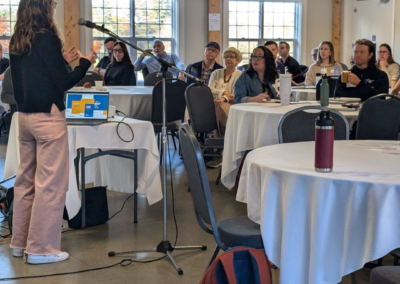‘Moored to deliverables’: Oromocto’s path to a resilient, net-zero future
Preparing a Community Energy and Emissions Plan (CEEP) is no small undertaking. But it’s a job Dallas Gillis and the Oromocto Climate Action Committee are prepared to tackle.
Gillis is Director of Planning and Compliance for the Ville d’Oromocto, New Brunswick. He comes face to face with the impacts of climate change regularly, and he’s very aware that the actions Oromocto takes today will have a big impact on how it will achieve a sustainable, resilient, net-zero future.
He’s fortunate to have chair Bruce Langhus, Clair Ripley and other members of Oromocto’s Climate Action Committee on his side. The committee, which advocates and advises on progressive climate action, is comprised of volunteer concerned citizens like Langhus and Ripley, plus members of Town Council and staff.
Ripley was Oromocto’s mayor for two terms in the 1980s, and was an early believer in the importance of sustainability and energy efficiency. “The actions we took back then – insulating municipal buildings, upgrading doors and windows and more – led to us being recognized as the most energy efficient community in Canada.”
Unfortunately, the momentum created by those early initiatives was lost in the ensuing decades. But now Gillis and the committee are working to revive it, and to develop the plans and actions that will move the town forward.
“Oromocto has an interesting uniqueness,” says Gillis. “The town was essentially built all at once, when CFB Gagetown was established in 1958.” That enabled the well-planned layout that gave Oromocto its longtime nickname, Canada’s Model Town. But it also means that much of the town’s infrastructure will age out at around the same time, which will bring resource and budgeting challenges.

Oromocto joined QUEST’s Accelerator Program in 2020.
“It’s been really helpful,” says Gillis. “It’s connected us to the information, people and resources we need to develop a CEEP, and it’s kept us moored to deliverables.”
A critical early step has been solidifying Council and community support. Gillis has been working from the inside, demonstrating the benefits of efficiency, sustainability and sound planning to Councillors and his staff colleagues.
“Payback is always top-of-mind, so I try to demonstrate that whenever possible, including with case studies from other communities. As well, I point out that having a CEEP will help us access more financial support programs, which enables us to leverage our own dollars and make them go further.”
Softer approaches have included promoting a vision and values that could help attract to new residents and businesses, and offering support to help staff and Council justify spending requests. It’s also not lost on Gillis that all New Brunswick municipalities will be required to have a CEEP in place by 2030.
Ripley, in the meanwhile, has been working from the outside. He presented to Council last year, urging a recommitment to sustainability. He’s also been one of the drivers behind the Climate Action Committee supporting Gillis – a group he’d like to see grow.
“It’s a good start, but I’d like to see us engage more people: citizens, representatives from the Oromocto First Nation, representatives from the business community, representatives from the Base, staff from more departments… the more people we engage, the better our chances of success.”
Their efforts have started paying off. Sustainability is now a regular part of the agenda of all meetings of Oromocto’s senior management. More town departments are recognizing the importance of efficiency and resilience going forward, and are looking to Gillis for guidance on actions and sources of funding. Sustainability messaging has been included in local communications like the town’s recreation guide. And Oromocto recently hosted its first Climate Action Conference.
“The conference was an important milestone,” shares Gillis.
“It helped us see what progressive communities like Quispamsis, Summerside and Shediac are doing, and what we can aspire to.”
It also enabled Oromocto to share its own goals and commitments – to ‘plant our flag’ as Gillis puts it – to help increase public and budget support.
Of course, it’s not a slam dunk. In today’s municipal environment, finding the budget and people to do what’s needed will likely remain a chronic challenge. But Gillis is optimistic, envisioning a future that includes net-zero standards for all new buildings, electrification of the town’s vehicle fleet, expanded charging infrastructure and greater public awareness of climate change. And as a planner, he has a particular interest in integrating sustainability, efficiency and resilience more deeply into Oromocto’s community plan.
Ripley agrees with that vision, and adds, “Efficiency has to be Number One: doing everything we can to get our energy consumption down in the first place.”
Their advice to other communities starting their own CEEP journeys?
“Don’t reinvent the wheel,” suggests Gillis. “There are tons of resources available to help, and what you need is probably already out there; you just need to find it.”
He’s also an advocate of programs like QUEST Canada’s Net-Zero Communities Accelerator Program, which provides municipal staff with step-by-step support and coaching. “It helps clarify and ease the process of developing a CEEP, and provides opportunities for networking and partnering – all of which can make life easier.”
As a retired teacher, Ripley is a big fan of greater public education on the risks of climate change. And as a former mayor, he’s acutely aware of the importance of embedding CEEP actions and activities into municipal by-laws, policies and plans to ensure their long-term continuation.
“Take some early actions and get some quick victories,” he adds. “There’s nothing like success to get people’s interest, engagement and support.”
ABOUT THE AUTHOR

Carl Duivenvoorden
Speaker, writer and sustainability consultant Carl Duivenvoorden helps people and organizations learn how they can save money, energy and our environment. He’s presented to over 450 audiences across Atlantic Canada and in the US, and his column Green Ideas ran for 10 years in New Brunswick dailies. He lives in Upper Kingsclear, NB.

About Powered by Communities
Established in 2017, Powered by Communities is an awareness-raising, communications and media platform that highlights and celebrates local community energy initiatives taking place across the country, from coast to coast to coast. The platform inspires, informs and engages its readership with stories and articles detailing community energy initiatives being led by local governments, municipalities, Indigenous communities, community groups, non-profits, charities, and enterprising individuals.

À propos de QUEST Canada
QUEST Canada is a registered Canadian charity that supports communities in Canada on their pathway to net-zero. Since 2007, we’ve been facilitating connections, empowering community champions and advising decision-makers to implement efficient and integrated energy systems that best meet community needs and maximize local opportunities. We develop tools and resources, convene stakeholders and rights holders, and advise decision-makers — all with the goal of encouraging, assisting and enabling communities to contribute to Canada’s net-zero goals.

Support local communities by sharing this story
MORE FROM POWERED BY COMMUNITIES
S'inscrire
Rejoindre la conversation!
Inscrivez-vous pour recevoir les dernières nouvelles et mises à jour sur les événements de QUEST Canada et recevez la newsletter mensuelle de QUEST Canada.




